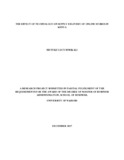| dc.description.abstract | Emergence of newer technology innovations and mobile-based technologies has contributed to
purchasing power of consumers. The online platforms have increased information penetration
and accessibility of goods and services. The study aimed to determine the effect of technology on
supply delivery of online stores in Kenya. The study was guided by two objectives: To determine
the effect of technology on supply delivery for online stores in Kenya and to determine the
challenges facing technology applied for supply delivery for online stores in Kenya. The study
was guided by the TAM Model, systems theory and resource based theory. The study adopted
descriptive research design in explaining the effect of technology on supply delivery for the
online stores in Kenya. The target population of the study was 18 online stores in in Kenya.
Since this was a small population, a census was used to sample two managers from each of the
18 online stores and therefore the sample size was 36 respondents. Both primary and secondary
data were used in the study. Primary data was collected using a structured questionnaire while
secondary data was collected from literature relevant to the study. The study used both
descriptive and inferential statistics to analyze data based on the objectives. The study found that
a positive effect was found between the types of technology (transportation management system,
seamless technology, transactional processing technology and radio frequency identification) and
supply delivery. The study concluded that the more the technologies were used in the online
stores, supply delivery improved. The study also concluded that supply delivery in the stores was
good, though was faced by challenges which hindered effective delivery. The study concluded
that the major challenges that faced the online stores were customer ordering products being
unresponsive upon delivery of the orders, complains about the period of time taken to deliver the
ordered goods, lack of adequate carriers to deliver ordered goods to high costs associated with
online supply delivery. The study recommends that the online stores needed to invest more in the
transportation management system, seamless technology, transactional processing technology
and radio frequency identification technologies to improve their supply delivery. The study also
recommends that the stores needed to outsource only the goods and services they lacked and
could not be able to provide in their firms to reduce costs. The study suggested that other
researchers can undertake a similar study on the same subject in other countries that have online
stores for comparison both regionally and globally. | en_US |



